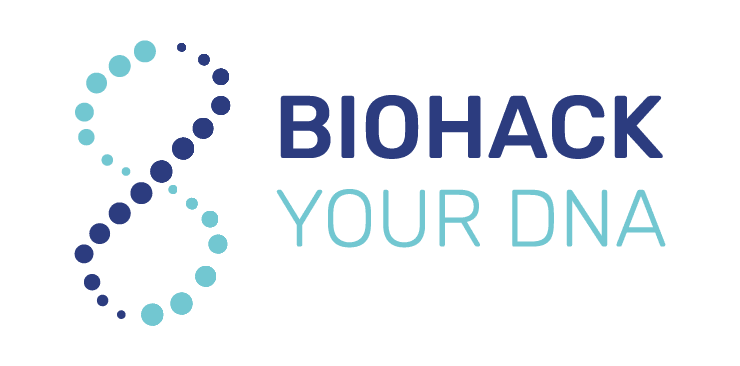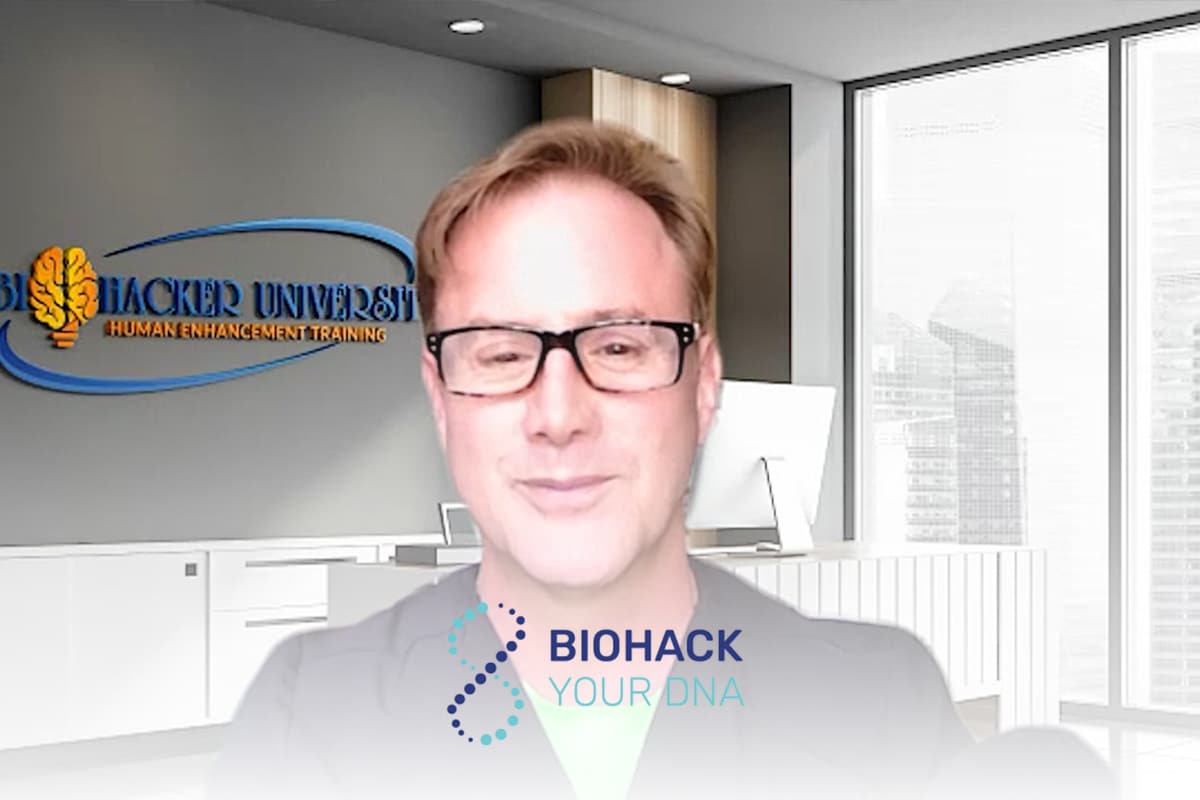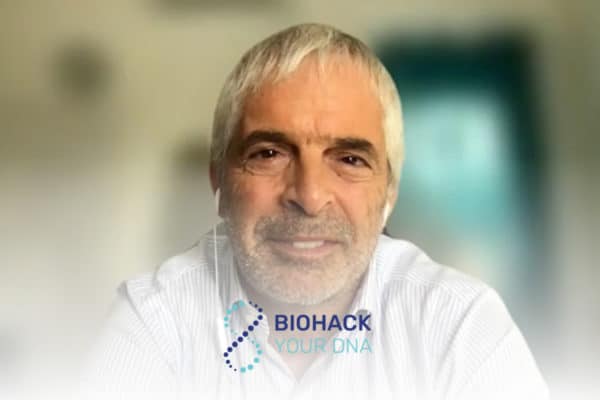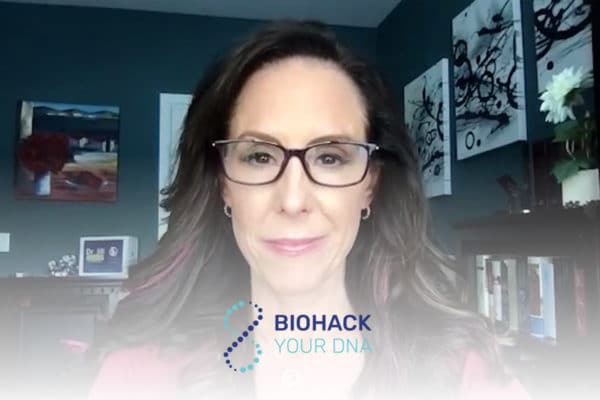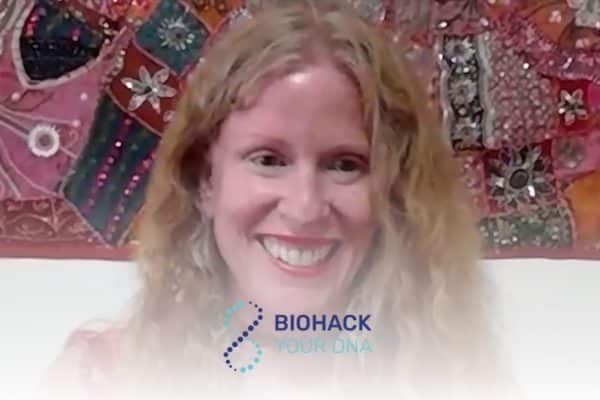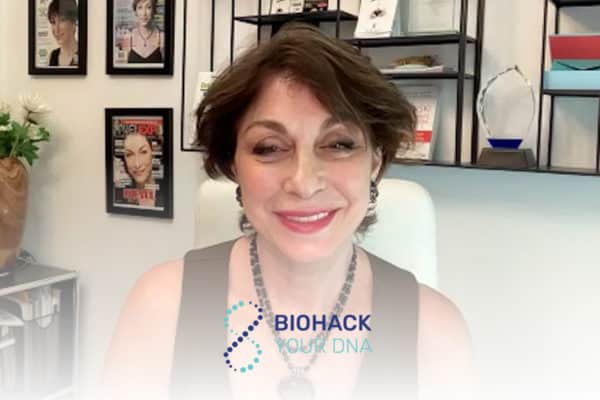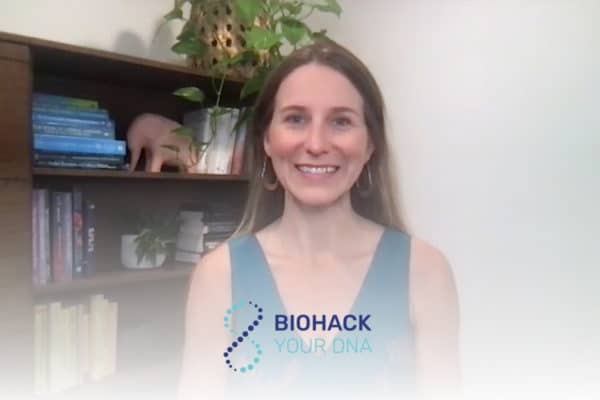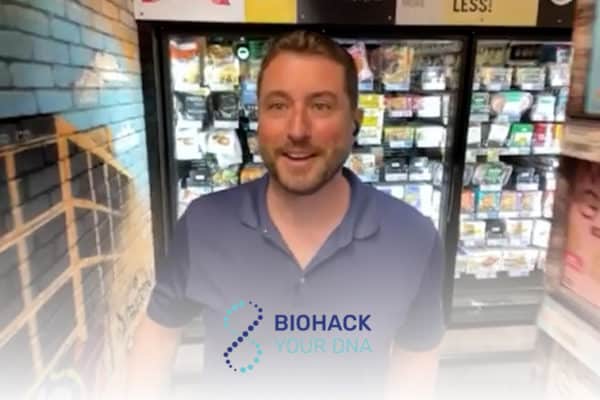Join the discussion below
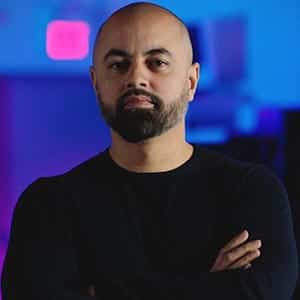
Kashif Khan is the Chief Executive Officer and Founder of The DNA Company, where personalized medicine is being pioneered through unique insights into the human genome. With the largest study of its kind globally, The DNA Company has developed a functional approach to genomic interpretation overlaying environment, nutrition, and lifestyle... Read More
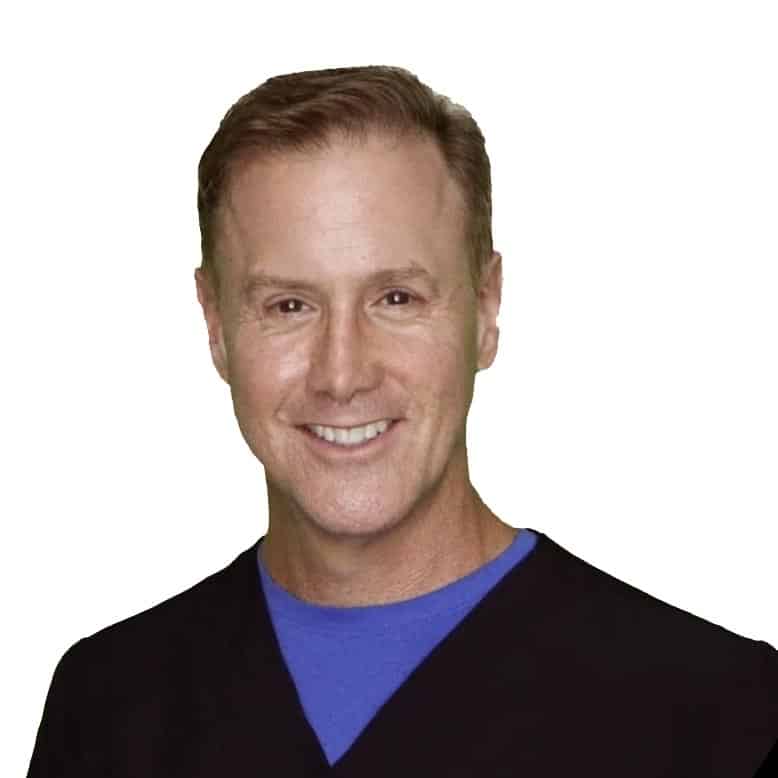
Dr. Ross Carter is a longevity specialist, keynote speaker, and 3x best-selling author. He received a fellowship in stem cell therapy in 2017 and is a specialist in Age Reduction & Biohacking. And If you ever get a chance to work with Dr. Ross, do it. Read More
- How to use genetic & epigenetic testing to create longevity programs
- What are the common myths about aging
- 10 ways to slow and even reverse the aging process
Related Topics
Anti-aging, BioHacking, Blood Plasma, Cellular Aging, Dna Reboot, Epigenetics, Genetic Aging, Genome, Rejuvenation, Stem Cell Therapy, Youthening FactorsKashif Khan
So we are now joined by Dr. Ross Carter, BSDC, and we’re gonna learn, well, two big things. And these two things are so related that we have to speak of them together, but it’s hard to find someone that can speak about both intelligently like Dr. Ross Carter, BSDC can. So, we’re lucky to have him here today. And what we’re talking about is aging, slowing it down, anti-aging, all this sort of buzzword you hear about. But what does it actually mean? What does it do? And then stem cell therapy, because they’re so intertwined. And the really cool
Ross Carter, BSDC
Yes.
Kashif Khan
thing here is that we have a unique individual in front of us, who can actually speak to it at the genetic level. Meaning how is epigenetics… And inform them some of this stuff.
Ross Carter, BSDC
Yes.
Kashif Khan
What do you need to know, genetically, he’s been doing this himself with patients. So first of all, thank you for joining us.
Ross Carter, BSDC
Thank you for having me.
Kashif Khan
So who should be listening first of all? Like, this is such a big topic, who really needs to understand anti-aging and stem cell therapy.
Ross Carter, BSDC
When I listen to press presentations myself, half the time, I’ll listen to the presentation and go, why was I listening to this? This stuff is not for me. I was like, I just wasted an hour doing this, this didn’t work for me. So, I really like to just come up front and say, Hey, look, this is what this presentation is for. This is who should listen to this. Basically, if you are someone who likes to really truly know how to prevent or undo aging in age related conditions, like chronic pain, physical disabilities, autoimmune conditions, deadly diseases. Or maybe you feel run down and don’t have the energy you used to. And you wanna look, and feel, and have the energy you did, like when you were half your age, or if you maybe have a friend or family member that’s experiencing some age related problems, and you want some advanced ways to help them. And the last one is maybe you’ve heard about high level professional athletes, like Rafael Nadal and Tiger Woods, that are using these advanced procedures to keep them in the game and excel in their life, and you’re curious about doing this for yourself, this is really what this presentation is about. So if you’re one of these guys, if you fall in this category, you should really listen to this talk. Because I’m gonna cover some really, really high level things, that I can promise you, you have never heard so far. So, I’m really excited to share it with you. One of the things… Yeah, go ahead.
Kashif Khan
So, that’s exciting stuff and I know that everybody wants to know all those secrets that you have. That’s sort of the professional athletes and the wealthiest people in the world already know about, but we all need to know about. But just to break it down, before we tell us like, what are the solutions, what even is aging? Like there’s age, here’s my biological age is… That actual process of aging, what is it? What does it mean?
Ross Carter, BSDC
Well, let me explain it this way. Let’s first start with a big question.
Kashif Khan
Okay.
Ross Carter, BSDC
What is the biggest risk factor for pretty much every disease you can think of? Now, a lot of people when I ask this question will think, maybe it’s smoking, or having a really crappy high sugar diet or high fat diet. Maybe it’s even sun exposure or not exercising properly, but the answer by far is aging. So guys think about it, how many children that you know, die of heart disease, cancer, or dementia. Really less than none, right? So, aging or age related conditions kill about 110,000 people every single day worldwide. Now I know that’s a really hard number to imagine. So let’s just take the United States Now, prior to the pandemic in 2019, here are the statistics. About 5,000 Americans died every day from heart disease, cancer, respiratory, stroke, Alzheimer’s and diabetes. Those are the top killers of Americans And that is about 5,000 deaths per day, due to an age related condition.
So let’s now define what aging is Aging is on several levels. On an organism level, It is the progressive change in an organism that leads to an increased risk of disability, disease, and of course, to eventually death. Now on a cellular level, it is an accumulation of damage over time, that the cell ultimately dies because of that damage. And it overwhelms the ability to continue to live. And these malfunctioning cells lead to tissue that starts to malfunction. The malfunctioning tissue, leads to malfunctioning organs, and the malfunctioning organs leads to an organism that’s functioning poorly. And this is what we call aging on more of a cellular level.
Kashif Khan
That’s really cool. Cause I think you’re breaking it down and you speak about it so elegantly and make it easy to understand.
Ross Carter, BSDC
Thanks.
Kashif Khan
But you are telling us what it is,
Ross Carter, BSDC
Yes.
Kashif Khan
I think there’s so much noise out there about aging, and anti-aging, and living forever and longevity. What is it not? What are some of the myths? Like the things that we’re hearing that we should ignore.
Ross Carter, BSDC
One of the primary ones, and this is gonna be kind of hard to believe, is that our cells actually don’t age. And now that’s gonna be kind of crazy. But let me explain how we figure this out. A while back, they were doing some experiments with rats, something called heterogeneous parabiosis. And what that means is they have taken a young rat, a very young rat and they took an old rat, and then they took them and they took their arteries and veins and they connected them. They suture them together, so they lived like that for a period of time. And what was amazing is they found that the old rat started to become younger. On all areas, on all tissue levels. It started growing hair back, its mental acuity became more acute, it’s a strength return. Everything on this old rat started becoming young again. And as a consequence, the younger rat also became older.
Kashif Khan
Wow.
Ross Carter, BSDC
So if that’s what happens and they could literally show that the cells became younger, then cells can’t actually age. It’s the factors that surround them that influences this aging. So this parabiosis demonstrated that something in the younger blood completely changed older cells to be younger, and repair all the problems that this aging process occurred. And so that was really what showed that aging is not… The cells actually don’t age, which is really exciting. Now, another myth that people commonly have is, that you can’t stop it. There’s no way to stop the aging process. Or at least you can really maybe slow it down, but not stop it. But that’s not actually true. Aging is not ingrained into our genetic code. It doesn’t say we have to age and die, which is kind of crazy. What aging is determined by, is it’s determined by three things. It looks at the environment that it’s based on the cells, based on the environment that it’s in, the cells that surround that cell.
And there are these pro aging and anti aging factors in the blood plasma that’s delivered to the cell. Now this is obviously kind of a departure from the common beliefs of cellular aging. Now it’s really controlled by the blood and it’s really mainly by the blood plasma. So if we can simply take someone’s old plasma and exchange it with young plasma, which they can do now, we’re literally turning back the hands of time, through system wide rejuvenation. And this is one big area or way to help with aging. The other way to accomplish that, is to put in anti-aging factors or pro youthening factors. Now these can be included like growth in nucleic acids that are commonly found in like things like placental tissue or even placental stem cells, which I’m gonna cover that in a little while. But both of these procedures
Kashif Khan
Sure.
Ross Carter, BSDC
can really reboot your DNA, which is of course your genome, to a more youthful state, which we’re gonna talk about soon. Now the third myth is, how well we age is not determined by our genetics. Now, I know you can speak a lot about genetics and I’m probably gonna repeat some of the things you’ve said, because you’ve taught me a lot myself, listening to your information. But I wanna incorporate it into this whole plan.
Kashif Khan
Sure.
Ross Carter, BSDC
Now we’ll talk about genetics in the aging process. So our genome or genetics, is in every cell in our body. It has identical instructions, about 3.2 billion letters, from your mother, from your father. And these letters make up your DNA, aka, your genome. And it codes for about 30,000 proteins that create enzymes and really the building blocks for life. Now, the proteins that in your genome that code when you were a child, are the same as when you were at 50. So you still have the same genome you did. However, there’s something that changes, it’s the expression of those genomes. This is what we get into what’s called epigenetics. Your epigenetics is the cellular software that controls your DNA. It tells what sells to turn on and what to turn off. It tells your genes what point to turn off and on it. Now, the cells with different DNA, how is it possible that one cell can be a muscle cell and then another on be a blood cell. And that has to do with the epigenetic expression. A way to think about this that makes it easy, is think of the DNA or the genome as this really large orchestra. The epigenome is the conductor that’s decides which instrument’s playing and what time it’s played. So that’s really how the epigenome work. Now I’ll give you a really cool example. When we’re children, we typically can drink milk without a problem. Most children can, not all. But in general, most children can drink milk. But as we get older as in adults, most of us become lactose intolerant. Now, since we have the same DNA, why does this occur? Well, the DNA that codes for the enzyme that breaks down milk, which is lactase, is no longer turned on, hence, we can no longer drink milk.
Now this is epigenetics the turning off or on of the DNA, that determines really your true age. And as we age, we have predictable patterns of the expression of our DNA. They actually have these clocks, they’re called Horvath clocks. And they determine what’s called your true biological age. And they’re really the gold standard at looking at age. And what they do is they look at what’s called methylation of your DNA. Think of it like rust. So you think of a DNA strand, the double helix. And then it starts to get this rust on it. And because of that rust is on it, it really turns off the expression of parts of the DNA. That is what is epigenetics. And that is really what is our aging process. That’s what causes us to age. And the way our epigenetics can be changed is by our environment, our lifestyle choice, and what I’ve mentioned before these youthening signals. This is what changes our epigenetics.
Kashif Khan
Hmm, so because you’ve been so precise about what aging is, which is really cool. Because you broke it down and literally laid out, here is what’s happening. There’s this rust, this residue, whatever you’re overuse this thing, there’s wear and tear and all of a sudden, certain spokes and cogs and wheels aren’t firing properly. And so communication is poor, things fall apart. So-
Ross Carter, BSDC
Yep.
Kashif Khan
If that’s the case and you’ve understood so, well, why it’s happening, do you also know how to slow down?
Ross Carter, BSDC
Yeah, so there are a lot of different ways to do this. I wanna go over what… when I work with somebody, my clients, there’re really 10 avenues that we look at. Some of them are self-evident, but most of them are more advanced. So let me go over like, say, 10 of these.
Kashif Khan
Sure.
Ross Carter, BSDC
First thing is, you gotta look at your blueprint. You know this as well as I do. You really gotta know what’s going on. The older tests, like when I talk to people, they go, “Have you ever had your DNA tested?” And you’re like, “Yeah, I had 23 in me or ancestry. And those can be 25 years old. So, you learn about where you’re from and then 10 seconds later, that’s over and now you’ve moved on, right?
Kashif Khan
Right.
Ross Carter, BSDC
And I think you’ve said this, the best is like the last couple years we’ve learned more about genetics than knew about in the last 20 years. I think that’s kind of how you said that, right?
Kashif Khan
Pretty close.
Ross Carter, BSDC
Yeah, close, something like that. But that’s in essence what I understood. So, what we need to do is find the best ways to optimize your health before your body starts to break down. Because we’re eventually gonna start to break down, and when we look at our genetics, what we know, or we’re more aware of what we’re more prone to. So here’s what I look at. I wanna find a out everything I can about a client and see what makes them, them. And I use the genetic testing, and I use the DNA company to do that, because they give us the best information. Now, after we’ve figured out your genetics, then we need to determine how old you are. Your current biological age. Now, maybe your ID says you’re 50, but are you really 55 or are you 45 biologically? Now we can actually test and know what your true age is. So we’ve used one of these age testing. There’s one of these tour And we can look at how old you really are. In addition, we can look at how fast you’re aging.
Because, we need to see if the things that you are doing now, your lifestyle choices, the diet, all these things that you’re doing are helping you slow the aging process or are they accelerating them? So we really need to see how fast you’re aging right now. The next thing, the fourth thing I look at, is your ideal diet for longevity. Now, everybody responds to food differently. So maybe, a vegetarian or vegan diet is really good for you. It’s one of my favorites, I like that. Maybe you’re paleo person, maybe you’re a Mediterranean diet. I don’t know, but this is where we can use our genetics as well, to look at what’s the best kind of food that you should be eating. As well as number five, which is creating customized nutrition. We gotta find out what your body needs. Everybody has specific nutritional needs, so we can use your DNA to determine that. Then something that a lot of people ignore which I don’t understand, but there’s always a fall off here, your sleep.
Kashif Khan
Yeah.
Ross Carter, BSDC
Most people I’ve… When I do a… I do seminars every week. And I’ll ask this question. How many of you in the last week have had a night or more, where you didn’t sleep well. And I’ll watch the hands raise, and it’s 90% of the audience,
Kashif Khan
Yeah.
Ross Carter, BSDC
with the other 10% just lying. So, basically I’m telling you most people in the world right now, especially going now, are having problems with sleep. And if you don’t fix sleep, how are you gonna let your body repair itself? It is really, really difficult. So you have to look at things that you can do yourself. These are easy things. Look at your circadian rhythm. Your circadian rhythm is the rhythm your body goes through on a 24 hour basis. It tells you when to go to sleep, it tells you when to wake up, tells you even when to eat. So look at your… The first thing I look at when I’m working with somebody is, how is their circadian rhythm? And most people’s are crap. And I’ll tell you why? It’s because we got a phone, we got our computer, we’re watching TV before we go to bed. And that light tricks our brain to think it’s still daylight when it’s not. So there’s a really easy solution that works for most people. Put on some dark glasses at night.
You can use regular sunglasses, but really what you’re trying to do, is block that blue light. So a couple hours before you go to bed, every single night, put those on, you can still see and do things. I wear them every night. And what it does is when you go to bed, you actually are tired. You’re not just wide awake trying to go to sleep, which is horrible. So that is a really easy tip to help with circadian rhythm. Then look at your sleep environment. Is it the right temperature? Is there any light going in? Is there sounds that are bothering you? Look at your environment to make sure that it is perfect for sleep. Keep in mind your bed is for two things, sleep and sex. And you’re not supposed to read in it, watch TV, play on your comp… Do anything else, don’t do anything in your sleep environment. Then you wanna create routines. In the morning you should have a routine of going outside, getting light in your eyes to turn off the melatonin production.
And you wanna have your nightly routines. So things that make you wind down. I like playing guitar, I do some yoga and stretching. All these things will help create routines that your brain really likes. It likes routines. You can check your oxygen levels too. Some people have sleep apnea and don’t know about it. You can do these little rings and put it on your finger, and you can go to sleep. And it’ll tell you all about your oxygen levels while you sleep. You don’t have to go to a sleep specialist necessarily, and you can find this information up front. Maybe your sugars are off. You can get those little CGMs, the glucose monitors. That’ll tell you if your sugars are bad. If what you’re eating is spiking your sugars, as well as when you go to sleep, you gotta look at those things. And supplementation. So when I look at somebody and I’m working with them, this is a big area. You gotta restore the sleep so that you feel better and you’re allowing your body to heal.
Kashif Khan
Yeah.
Ross Carter, BSDC
Now, the next thing is number seven, which is called fasting. Now, I’m sure you’ve all heard about fasting. Intermittent fasting, all these things. Really the essence of fasting, it helps to clean up the cellular components that the debris. It helps decrease inflammation and it boost your cell production. There are a lot of benefits for fasting. It can help you lose weight if you wanna do that. But fasting is one of those easy ways to restart your body. The next thing is, now we’re gonna get into more advanced things. Things called senescence cells. You wanna eliminate these senescence cells. They’re also called zombie cells.
And what are they? These are cells in your body that… Normally your cells have a auto destruct. They die when they’re done. After they’ve replicated a certain amount of times, they die. And they kind of explode actually. Senescence cells didn’t do that. What they did, was they turned off their productive function, and now they just sit there and don’t die. And they produce these inflammatory components that cause chronic inflammation. And they also influence the cells around them to do the same thing. And you create what’s called inflammaging. Inflammaging is really just chronic cellular inflammation that you really can’t get rid of. And if you can use products and substances and there’s supplements out there, there’s medications that can help eliminate these senescence cells. And they’ve showed on studies with like rats and things like that. If you eliminate the senescence cells, they can live 20 to 30% longer. Which just think about how long that is. That’s an amazing, if you can do that in a human. You’re 80 years old, you can live up to a hundred, just by eliminating one little component, which is pretty amazing. There’s drugs, like dasatinib. I think it’s dasatinib and quercetin are good examples of things you can take. Number nine is use something like blood plasma exchange. Now this can be a little controversial, but think of it like doing an oil change for your body. Blood plasma is a giant controller of aging. Like I mentioned when we talked about parabiosis.
And if we take out your old blood plasma, and replaced it with new blood plasma, we’re removing all these pro aging, these pro inflammatory chemicals that build up in that. So you’re getting like an oil change. And it can really, really make a huge difference. Now, there are methods out there throughout the countries, where they’ll take the blood, they’ll pro inflammatory it, and they’ll use lights and they’ll put it back in your system. Or you can actually get blood plasma from younger sources, there are companies that offer that as well. But if you can basically filter out all the aging factors in your own plasma, this makes a huge difference. And the last thing, which is the kind of the most exciting area is what’s called, young stem cell infusions.
Kashif Khan
Right.
Ross Carter, BSDC
Now, let’s talk a little bit about stem cells. Stem cells are great at stimulating tissue repair, they create blood vessels, they help prevent cells from dying, they stop inflammation, they can eliminate pain. But most importantly, they can reprogram youthfulness in the cells by adding these pro youthening factors into the blood plasma. They use this really cool system, a messaging system. So, when you put a stem cell in the body, it doesn’t… Let let’s say, if you’re putting it into your knee, for example, it doesn’t create new tissue per se. That’s another misconception. What it does, is it coordinates the repair of the damage that is there. And it does this through an amazing system. Where it surveys the area, then it creates these little tiny bubbles of information. It basically tells you it has these instructions in it. And it sends out these little instructions to these cells. All of our cells are basically little factories. They make whatever proteins are necessary. So they receive this signal from the master control or the stem cell, and then it starts to produce these proteins to help solve or fix any problems. So we can use this as a repair system of our body. Now, these little tiny particles are really what contains like nucleic acids and contains these growth factors, is really what causes the therapeutic response. So what they found out recently, is that we don’t actually even need the live cells. Because live cells, putting in live cells in someone, causes a lot of problems.
Your body is gonna freak out, it’s gonna kill ’em. But these therapeutic little messages are not perceived as foreign, and they still have the same therapeutic response. And so now we’re just using just those nanoparticles, that’s what they’re really called, to influence the body to heal itself. So you can infuse these nanoparticles directly into your body without any live cells, and it can stimulate the body to heal itself and take down inflammation. BUt it also influences the cells to change the programming into more of a youthful state. So, those are really the top 10 ways that when I’m working with somebody, we look at, to really not only make them a little younger, but years, decades younger. And this is the way that science is really discovered to really make us literally 10 years younger than we are.
I don’t know about you, but, I would love to be 10 years, 15, 20 years younger and stay that way. That’s life is all about, is to stay healthy and young and vibrant. Just imagine how life would be different for your listener here, who, let’s say they cut 10 years off their life. Would they travel more? Would they enjoy their family more? They’ll play with their kids or grandkids. If you think of the difference on how much 10 years of health span would make in someone’s life. So, I love to see that with results with the clients that I work with, is really making a huge difference in their health.
Kashif Khan
What you’re describing, I’m gonna repeat these 10, ’cause I think this list is really-
Ross Carter, BSDC
Okay.
Kashif Khan
Thorough, but what you’re describing in the outcome, it’s not so much,” Hey, I’m gonna let you live longer. I’m gonna help you prevent disease.” Which is good, but it’s not extending your youth. That you’re telling somebody, however you felt 20 years ago, I’m gonna give you another 20 years of that.
Ross Carter, BSDC
Well, there’s three categories, they used to be two. There was lifespan, which is how long you live, then there was health span, how long you’re healthy during that period of life. So, most people have been focusing a on health span. It’s making your health as healthy as possible for the time you’re alive. But now I present what I think is a good way to say is, you reprogramming your youth. Not just extending your health, but making you actually younger. There was a study that done a year ago, where they literally used these type of nanoparticles into their body of rats. And they cut ’em in half in terms of age, not physically. But their age was half their age. They’re trying to get this through the FDA right now and everything. It takes a while. But, what my thought is on what that is, is we have found the fountain of youth. We have actually found a way to cut our age in half. And it’s just a matter of time. So we gotta stay healthy until we get this, right?
Kashif Khan
Yeah.
Ross Carter, BSDC
It’s gonna take time to get this through, but I would predict in the next less than 10 years, probably five years, we’re gonna have this elixir, that will actually make us stay at half our age. It’ll be unbelievable. But, think about it this way. You’ve got billionaires invest in this. Now, think about space travel. Before, the only way you could get into space was NASA. And then you got these billionaires saying, “Well, I wanna get in space.” And then they use their leverage and their money to be able to get anybody out to space. Now you’ve got anybody who wants to pay the money to go out there in space. So now you’ve got these billionaires wanting to live forever. So what are they doing? They’re investing in these companies that are actually doing that. They’ve already really figured it out. But they’re making it so that they can stay around for longer. And as a result, guess who else gets to benefit? We do,
Kashif Khan
Yeah.
Ross Carter, BSDC
when it’s released. And you’re talking trillions of dollars in money, who doesn’t want to stay young? We all do.
Kashif Khan
Yeah, for sure, it’s really cool. ‘Cause you hear all… There are guys like Peter D Montes and Tony Robbins, and all these people saying that if you can just get to 2030 and not break everything.
Ross Carter, BSDC
Yeah, exactly.
Kashif Khan
You’re gonna be in a whole other paradigm of healthcare. Because what’s gonna be available. The innovation that today in the 4, 5, 6 years, it takes to clear it and get it approved in use.
Ross Carter, BSDC
Yes.
Kashif Khan
We are blessed in terms of what’s coming. So, this list of 10, I’ll just quickly cover it again. So-
Ross Carter, BSDC
Go ahead.
Kashif Khan
DNA testing, understand your blueprint, here’s your foundation, right?
Ross Carter, BSDC
Yep.
Kashif Khan
Number two, is your biological age. Which is really about methylation markers, epigenetics. So understanding DNA is, who are you? And then epigenetics is where are you at?
Ross Carter, BSDC
Exactly.
Kashif Khan
So you know the meaning of the two Then diet, of course, and you said the primary tool you use for diet is looking at genetics.
Ross Carter, BSDC
We look at genetics mainly. Yeah, that’s the primary source. Now we do extend more than… Obviously I didn’t wanna go way past 10, but we can also do blood tests, all those things. We look at epigenome as well, things like that. But I just wanted to give you just a little tet.
Kashif Khan
If anyone actually does this and you don’t live to 150, there’s-
Ross Carter, BSDC
You’re doing something wrong. ‘Cause I incorporate… Get this, with these programs, I always incorporate a health coach. And we use the wearables.
Kashif Khan
Wearable,
Ross Carter, BSDC
The wearables, and that way you can’t cheat. Because we can upload your data into a graph. And it’ll tell me if you’re sleeping or not, what’s going on, and if you’re exercising. So I can know all this stuff without you telling me a thing. So you can’t cheat as a client of mine. You just can’t do it.
Kashif Khan
As it should be, because there’s a big difference between when something hurts, I’m gonna call you, versus constant real time feedback and intervening before the problem happens, right? That’s what-
Ross Carter, BSDC
Absolutely. Some of these things actually can monitor your temperature, and it can predict if you’re developing COVID, before you even have symptoms. It’s pretty cool.
Kashif Khan
Yeah, I know. Oura Ring made a deal with some hotel in Las Vegas, I think MGM or something, for that purpose. Because they needed to- So number four, nutrition, obviously. Six is sleep, good quality sleep. Seven is fasting. We’re gonna maybe talk a little bit more about that. Eight is eliminating senescence cells and you mentioned a few things people can do. Nine is blood plasma exchange, which is such a cool concept because you’re literally, as you said, getting this oil change. We make sure there’s a sticker on our windshield that we would see that marker, like, here’s when I gotta do it, you don’t do it crazy.
Ross Carter, BSDC
Exactly.
Kashif Khan
Three kilometers over and you get anxiety issues. Meanwhile, you think that I can eat Subway Sandwiches my whole life and not have to change my blood. Stem cell therapy is the last one. And that’s where you’re getting more targeted. And you can do everything, but you can also resolve very specific problems. So, when it comes to sleep, the way you talked about it, I think, you’re like everybody raised their hand, right?
Ross Carter, BSDC
Yeah, every time.
Kashif Khan
There’s this culture of… And it’s a culture we have to sort of shed, and newer generations don’t have it. Of like this, you’ve gotta fight and be strong and sleep is for weak people.
Ross Carter, BSDC
No.
Kashif Khan
That’s really what people… The challenge of, you’re literally telling me to be a looser, I’m weak. Like, why should I need to, I can fight through it. I only need three hours a day.
Ross Carter, BSDC
No.
Kashif Khan
So it it’s also eliminating the beliefs or the concepts of what these things are, and what they actually are forced. And this is where that fountain of youth is not… All it’s about the tool, but it’s also about knowledge. It starts with even understanding, that fountain is full of knowledge. That’s what you need to acquire.
Ross Carter, BSDC
Yes
Kashif Khan
So it comes to stem cell therapy and the blood plasma exchange. The way you spoke about them, are these things that you can sort of walk into your clinic, or do you have to go out of the country, or how do you get these things done?
Ross Carter, BSDC
Well, it’s both, actually. Some of these procedures you have to do in another country because they’re not allowed.. For example, the use of expanded stem cells as a therapy, whether it be IV, or as intramuscular, or inter distal or joint therapies, are really frowned on by the FDA. That’s kind of the old mindset, when it comes to stem cells. There’s actually kind of a 2.0 version. I call it the next generation of stem cells, is just using these little signaling molecules. These signaling molecules are really what causes the therapeutic effect of a stem cell. So you got a stem cell and it sends these messages. And then those messages stimulate the therapeutic response.
So about seven years ago, they found out, well, what if we just removed the stem cell from this whole equation? Use just the therapeutic little messages, and guess what? You get the same response, without even having to put a live stem cell. It’s like, a stupid example I like. Is, let’s say you like sweet coffee. You like your coffee and you want it sweet. So you could, if you wanted to. Let’s say you liked honey to make it sweet. So you could go to one of those beef farms, and you could maybe go to one of those little hives. You could pull up the little thing, get stung a few times, but get some honey and put in your coffee, and guess what? You have sweet coffee, plus a few of stings. Or, you could just go down to Publix and pick up a bottle of honey that’s already done that. So it’s better just to you use the honey than it is to go through the bees.
Now, in this case, the example is the bees are the cells and the honey are the little nanoparticles. And so all we need to do is use these nanoparticles and they can get them. What they do is, in labs, they can take these different cells and stimulate them to release these particles and then just capture particles, and they use that in a therapy. Wether it be a joint injection, they can do it for any type of procedure. But systemic wide, it really can make a huge difference on taking down inflammation. Now, like I don’t actually treat any specific condition. I work with a medical team. This is not just me, this is a medical team. But we don’t treat any condition.
‘Cause if we were treating condition, we’d be doing drugs. We don’t do that. What we do, is we make your body work better and take down inflammation. Because inflammation is usually at the heart of pretty much every disease process. Let’s say you’re having exacerbation of eczema or auto immune condition. If you take down the inflammation, that problem can go away. And if you convert the inflammatory markers in your blood to be anti-inflammatory markers, that way it could stay away a lot longer or permanently based on the conditions. So, I don’t treat a condition, none of our medical team actually treats conditions. What we do, is optimize your body’s function, allow it to heal faster and better, and take away inflammation. At the same time we’re basically tricking the cells into believing that it’s in a younger body.
Kashif Khan
That’s-
Ross Carter, BSDC
They’ve taken… Listen, they’ve taken cells from a very old person. They’ve added these chemicals, they’re called Yamanaka factors. Basically, what it does is it converts the cell into an embryonic type state. They’ve implanted them into a young animal or person. I think it was an animal, yeah. And then the animal, the cells worked in through the whole life cycle again. So they literally could take that. So the cell can be reused. That’s why I’m saying that, cells don’t actually age. It’s the environment and these inflammatory factors that determine how it’s gonna function.
Kashif Khan
So it’s more like they get worn out. It’s not that they’ve-
Ross Carter, BSDC
They do.
Kashif Khan
Just taken for granted. You have this many years from birth, it’s more like, what did you do with this equipment you’ve been given? If you wore it out, well, it’s not gonna last that long.
Ross Carter, BSDC
Right, it’s like the example where I was saying with the rust and the DNA.
Kashif Khan
Yeah.
Ross Carter, BSDC
Basically, if we could just put some… This is only for people that are 50 and above will understand this, especially guys. So if we could take some WD-40 and spray down, we can get rid of some of that rust, it’ll work again, man. But that’s only for old people like me that know what WD-40 is.
Kashif Khan
I remember when I was a kid
Ross Carter, BSDC
Most of the millennials will go, what the hell is that? Ask parents? ‘Cause we all know what that is.
Kashif Khan
Yep, cool. So, as we’ve been speaking, I’ve been looking behind you and I see the Biohacker University.
Ross Carter, BSDC
Yes.
Kashif Khan
What’s going on there? Are, you bringing the knowledge to the sort of consumers, clinicians, what’s going on there?
Ross Carter, BSDC
Both. I found that there’s been a very big lack of communication between the medical community and these biohackers. That basically are using technology and supplementation to maximize someone’s health. But then when it comes to doctors, you got the doctors just doing their traditional, “Hey, let’s cut you open and do some surgery, or will stick you on this drug.” And, I mean really? That’s how our healthcare system is. We’re sick here. We’re not looking at ways to prevent problems in the future. So why not bridge the gap and say, “Look, these technologies work.” They are amazing. Light therapy, sound therapy, you’ve got all kind of different things that biohackers use, that we could incorporate into medical practices, into health coaches, and even just the general public could use for themselves. So that’s what the Biohacker University is all about. Is really taking all the different tech technologies and creating it in a cohesive program. It’s like when you go to one of those biohacking seminars, You get a flood of information, and then you have all these vendors trying to teach you something. And you really don’t go away with a lot of really great knowledge of how to integrate into your life.
So this is about training, so you can learn all the things and go, wow, I didn’t know that I could look at my biological age. I didn’t know that red light therapy, how it works and what it does. I didn’t know sound waves could actually influence the way my cells function. What about hyperbaric chambers or cryotherapy? There’s all these things that, how many doctors ever talk about? Zero? Nobody says, “Hey, I see…” I’m a doctor in this, I’ll say, “Hey patient, I understand you got a lot of inflammation. Here, why don’t you take this Advil?” They don’t say, “Hey, why don’t you go do some cryotherapy sessions and do systemic take down into that inflammation.” You don’t ever hear that, right?
Kashif Khan
Yeah.
Ross Carter, BSDC
But that works really, really well.
Kashif Khan
Yeah.
Ross Carter, BSDC
So my goal is really to integrate this, and bring about all the technologies that have been advanced in these areas. And bring them and basic put ’em together, so that not only clients, but also doctors can integrate this with their patients.
Kashif Khan
This was so needed because we know that there’s the biohacker innovators. Like, five years ago, nobody knew what that word even meant.
Ross Carter, BSDC
Right.
Kashif Khan
Now, it’s kind of mainstream, there’s conferences all over the place. But it was still fragmented. Meaning that somebody that wanted to get in, and learn, and get better, didn’t know what all the tools were. And when to use it and how to use it. What’s right for them. So you’re kind of curated all of that and said, though I-
Ross Carter, BSDC
Well, here’s the problem. The way they learn is from vendors. The problem with learning from a vendor is they have one focus. Because they’re like, “My product is the best. You should buy my product, just take our word for it. This is why it’s so great. Everybody else’s product sucks.” This is what you need to do, because why? It’s all about the money. So let’s look at science. Let’s look at the science behind everything that is promoted and see if there’s some validity in what they’re saying. Maybe it is, but it’s not the only tool. When you’re a hammer, everybody is a nail. So you don’t want that mentality of, this is the best. Because that’s what a sales rep is gonna do. I started the stem cell field back in 2011, which makes me a grandfather in this industry, which is surprising. At 41, that’s how old I was. I decided I wanted to meet girls and I wanted to do recreational sports. I went to play… Here’s a bad sport to play for meeting girls, Dodge ball. Just a bad idea. ‘Cause when you smack a girl with a pink ball or a red ball, that’s going 50 miles an hour, it is really difficult to ask her out on date. Just a word, don’t ever do that.
Kashif Khan
That’s good advice, not that many people-
Ross Carter, BSDC
Good advice. So, while I was playing, I literally threw it too hard. I tore my ACL, landed on the ground, left and got some MRIs, and I tore my ACL. So I went to an orthopedist, and what does he want to do? Think about it. An orthopedist wants to do surgery. That’s all they think. They’re like, I do surgery and I get paid for surgery. I went to him and said, “Hey, what, what options can I do?” And they said, “Well, we can, repair your ACL.” Because that’s what I want. I was like, “Let’s see what we can do to repair it.” And I said, “Well, explain that process.” And they said, “Well, what we do is we take cadaver tissue, and we take out your old ACL, we put that in. Or we take part of your hamstring and we’ll put that in.” And I was like, wait a second, you said repair.
Kashif Khan
Yeah.
Ross Carter, BSDC
And this is not repairing this replacing. If you have a re… Let’s say you’re having challenges in a relationship, you could repair that relationship or you can replace that relationship. Those are completely different. So he felt that repairing was replacing. And I was like, “No, thank you.” And so, that’s when I’m researched a bunch about what to do. Because there was a gap between physical therapy and surgery. Because that was what I’d been doing, is physical therapy. So that’s when I learned about stem cells, I learned about it in Thailand of all places. I flew there, spent three months learned all about it. And that’s how I got knowledgeable on it.
And we started doing it in our office in Atlanta. I grew up one of the largest stem cell specialist center in the south. And then I got a Fellowship from the American Academy of Anti-aging medicine and Stem Cell Therapy. So I was all in with this therapy because I saw the impact that it can make. And as the time has progressed, I learn about newer ways to do this therapy. Like I said, with these little nanoparticles, they get the same result. We’re not putting live cells in anybody. Nobody wants add foreign DNA in your body, I’m just telling you. It’s not a good idea. So it doesn’t have any DNA in it. These little particles are free of DNA. They have growth factors, they have nucleic acids, but not DNA. They have RNA in it, basically.
Kashif Khan
That’s so cool, and so if people… I’m sure everyone listening here is like, “Well, how do I work with Dr. Carter?”
Ross Carter, BSDC
Oh yeah.
Kashif Khan
The list of 10 is interesting. But to work with you is a completely different experience. So, how does this typical… Is it like patients enroll with you? Is there a program? What does it look like?
Ross Carter, BSDC
I’m mostly a referral program. I don’t advertise or anything on… I do a lot of speaking. And so basically somebody who wants to talk to me, I have two different routes. I have my business set it up, which is biohackeruniversity.com. It’s biohacker, like the person, not biohacking. So it’s biohacker, university and dot com. And then of course, I have a general my own little website, Drrosscarter.com, D-R rosscarter.com. Either way those are easy ways to get in touch with me. And really, you know what? My purpose is really to help educate people to understand that there are so many alternatives that they never knew about, that can make a huge difference in their life. And that’s why I do all this. I retired from active practice, now I’m more of just an educator and a trainer. I’m not really active in doing procedures. I work with a medical team that does all these things.
Kashif Khan
That it’s awesome to know, so that people aren’t sort of… The list you provided everything you’ve said today is so insightful, but then do you actually get it done? Do you do it? People have heard bits and pieces of these things, but they don’t actually do them. To work with somebody to build the plan, to give you that accountability to coach you through, and your team does that. I would advise everyone to try and take advantage of, if you wanna add those 10 healthy years to your life, right?
Ross Carter, BSDC
Now, let me do a word of warning. Don’t contact me if you’re not ready to take responsibility for your life and your health. I used to get these clients that would come in, they were 400 pounds, had shot knees, and they want me to do an injection in their knee to fix all their problems. And I would turn ’em away because it’s like, look, if you’re not gonna take responsibility for your health, then why should I? I’m all in as long as you are. So if you’re really committed to following through, then this is the right place. If you’re looking for the Walmart of regenerative medicine, I am definitely not your guy either. I’m sure you can find much cheaper people, that’ll do crazy stuff. But I’ve spent my last 11 years understanding these things. And I’m the one that’s actually probably training your doctor. So, that’s what I’ve done. I’ll give you the example. I’ve been consultant for some really high level people. I can’t name ’em all, but I can name one that you would know. Tony Robbins, for example.
Kashif Khan
Right.
Ross Carter, BSDC
Now, if you look in his book, which is fantastic by the way. It’s called, “Life Force.” Look at the back on page 6, 6, 0, 660. You’ll see on the bottom paragraph, it’ll say, I want to thank my health team. You’ll see my name there. And I’ve been an advisor for him personally, not just his team, but him personally for the last five years. I don’t do stem cell regenerative procedure with him, but I do advise him on those areas. And I’ve done that for the last five years, every single month. So I always giving him education training, ’cause the man is brilliant. He is a most amazing person I’ve ever been around. and he’s so congruent with his beliefs. So get his book if you haven’t. But that’s the level I worked with. I work with people that wanna change their life and I can do it. I can help them do it as long as they commit. They have to commit, I don’t want any tire kickers. Forget that.
Kashif Khan
It’s what you’re providing in the access and I’m sure your time is already stretched. But fair enough, people should be in it to win it, right?
Ross Carter, BSDC
Exactly. And if they’re not, I’m not your guy.
Kashif Khan
Yeah. So this was eye opening, it was awesome. I wanna thank you for taking the time. I would urge anyone that wants to… So there’s a lot of sort of healthcare professionals, health coaches listening. Also, look at the university, ’cause if you wanna up the game a little bit, and if you wanna ride that wave that’s coming, everyone’s looking at personalization, biohacking, what are the tools? And there’s gonna be an expectation that you should know. And here’s a great place to go for it. But in general for everybody else, again, here’s your list, but you need someone to sort of work with you on it, and guide you through and provide you access to certain things.
Ross Carter, BSDC
Make you responsible.
Kashif Khan
Yeah, make you responsible, exactly. So thank you again. This was awesome. Pleasure to speak to you today and thank you for joining us.
Ross Carter, BSDC
My pleasure, thank you.
Downloads
